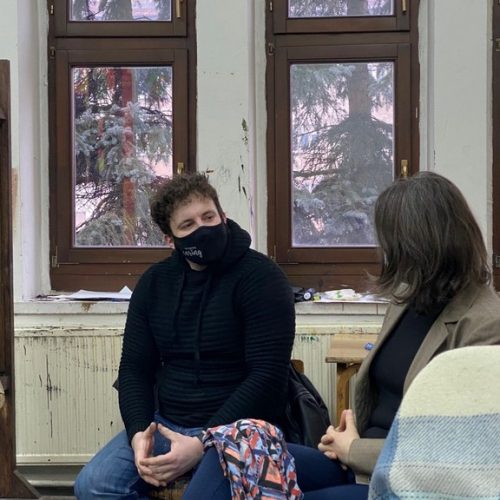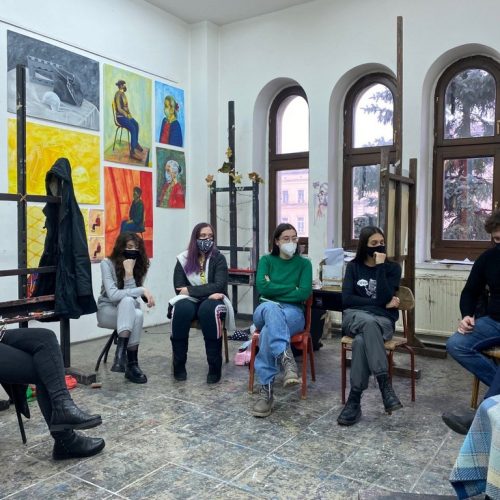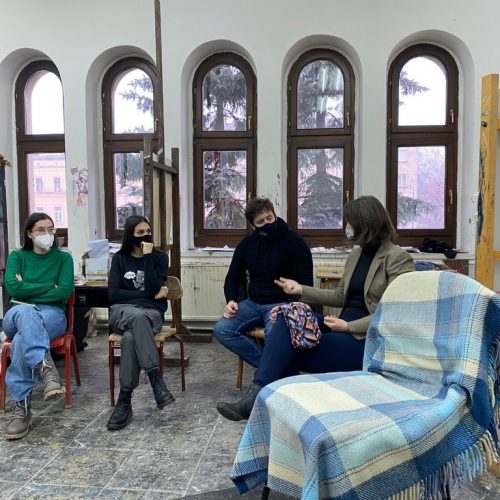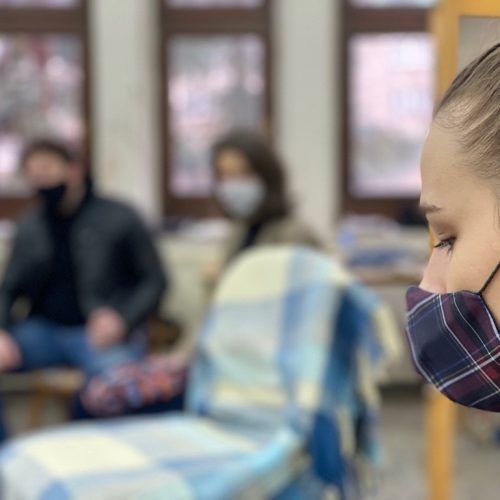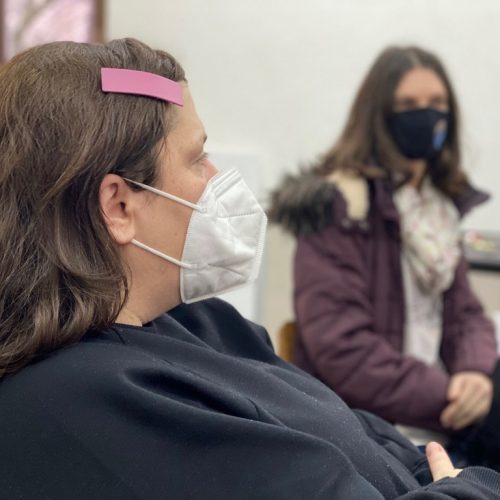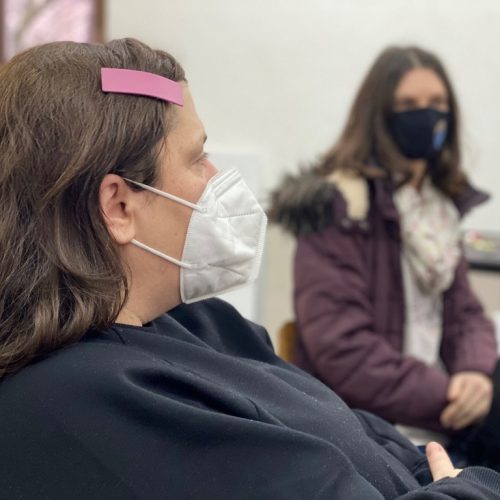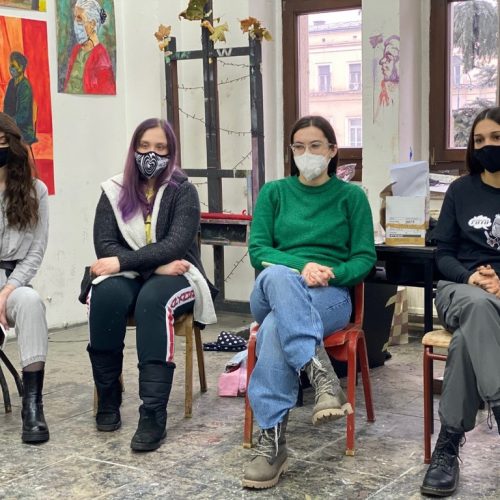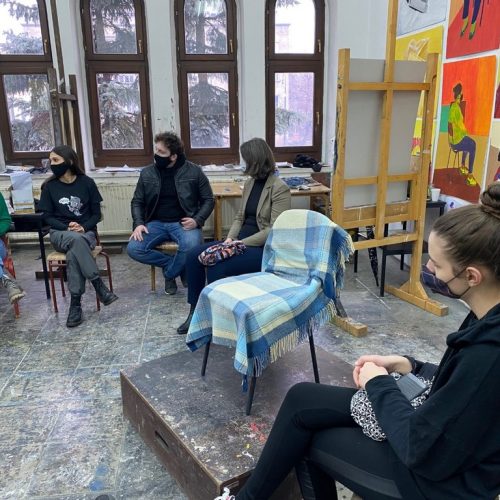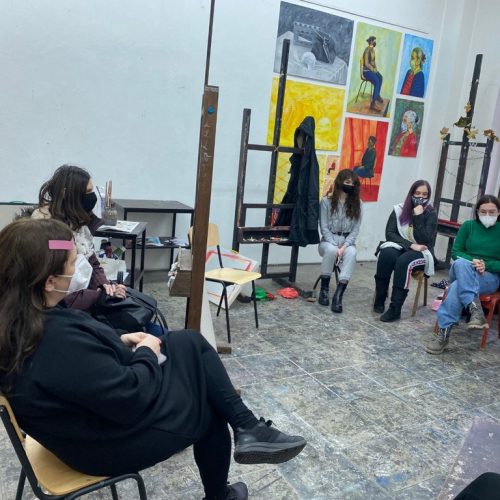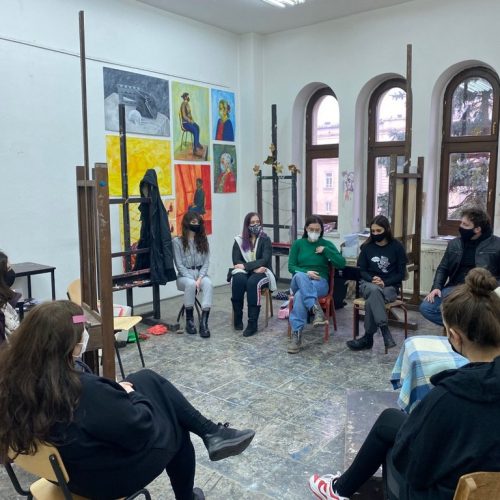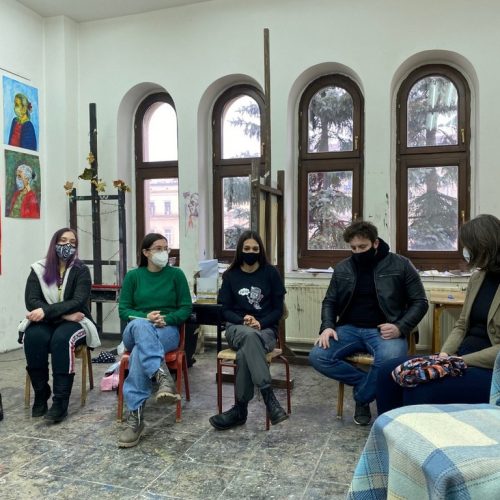On Wednesday, December 29, 2021, the first meeting within the research project titled “The impact of improved artistic infrastructure and digitalization of fine arts teaching on students’ creative process, their capacity for entrepreneurship and active work in the field of creative industries” took place at the Art Education Department of the Academy of Fine Arts, University of Sarajevo. This art-based research project is supported by the Ministry of Science, Higher Education and Youth of Sarajevo Canton and will be implemented in the current academic year. The meeting was attended by two experts in the field of creative industries and cultural policies, Aida Kalender and Aida Vežić, as well as students who are members of two focus groups involved in the project. During the project’s implementation, through a series of lectures and workshops Aida Kalender and Aida Vežić will share with the students their valuable expertise and hands-on knowledge on creative industries, cultural policies, and cultural management.
The project departs from the hypothesis that the impact of digitalization on the teaching of fine arts and contacts with the private sector encourage creative activities and strengthens the capacity of students for work in the field of creative industries. By encouraging students’ creativity by means of the latest technologies, and in a context that deviates from traditional forms of teaching fine arts, we want to determine how much and how these technologies contribute to artistic and creative potential.
Due to the SARS-CoV-2 (COVID-19) pandemic, traditional forms of teaching fine arts underwent intensive digitalization. The sudden disappearance of direct contact between teachers and students created room for new models of teaching, which were previously predominantly based on the physical realization of creative tasks in the field of fine arts. Since it was forced upon staff and students by the crisis caused by the pandemic, digitalization of fine arts teaching was initially perceived as a negative phenomenon, as it prevented the possibility of direct contact between teachers and students, i.e. complicated the direct advisory role assigned to teachers in the creative process. Nevertheless, after an academic year during which teaching fine arts was realized almost entirely under a “hybrid” regime, initial findings suggest that the process of digitalization has had some positive, potentially useful, results. Namely, due to the imposed restrictions students began to develop digital knowledge and skills meeting the requirements of modern creative industries in terms of digital creation, presentation, communication and other relevant skills. The project will aim to determine the scope and impact of digitization of fine arts teaching on strengthening the students’ capacities in their creative work and propensity for future entrepreneurship.
About the experts
Aida Kalender, program director of the NGO Akcija and Head of the Creative Europe Board for BiH (kreativnaevropa.ba) for the period 2015-2020. Responsible for the strategic program development of Akcija, she conceived and led the civic campaign “I am the Museum” (jasam.zemaljskimuzej.ba), which resulted in the opening of the National Museum of BiH after three years of closure (2012-2015). The campaign was described by many analysts as the greatest success of civil society in BiH after the war and was awarded the prestigious European Commission Award for Cultural Heritage Europa Nostra. She is one of the founders of the Futura Music Festival and a long-term associate of Mediacentar Sarajevo, where she worked as the editor-in-chief of the web portal Media.ba. Aida worked as a journalist and editor at Radio ZID during the siege of Sarajevo and was one of the initiators of the project “Rock Under Siege”. In 2005, Aida was awarded a master’s degree in Arts and Media Management in the European Context from the Utrecht School of the Arts in the Netherlands, and in 2008 a master's degree in European Cultural Policy from the University of Warwick in the United Kingdom. Aida was a Fulbright scholar at the Smithsonian Institution, Washington in 2020/2021.
Aida Vežićhas a bachelor’s degree in Economic Sciences. Aida is secretary general of the Balkan Museum Network (BMN), which has been developing since 2006 and has over 200 members from 13 Balkan countries. She has a master's degree in “Cultural Projects for Development” from the International Labor Organization and Politecnico di Torino, after which she realizes her activities in the field of culture and heritage, strengthening the capacities of independent cultural organizations. As a consultant since 2001, Aida has been developing civil society organizations both in BiH and in the Western Balkans region. She is a certified facilitator and trainer, and a member of the Board of Directors of the Culture and Arts Association “Crvena” (Red). As the coordinator of the philanthropy program at the Mozaik Foundation, she has been working since 2020 on improvements of the legal framework for charity in Bosnia and Herzegovina. Aida is a passionate volunteer from the “Older Brother, Older Sister” program.
The project leader is prof. dr Jasmina Gavrankapetanović-Redžić and the researcher on the project is prof. dr Iva Simčić.


